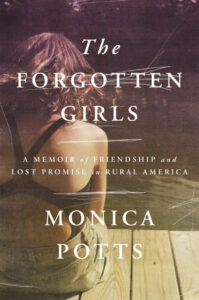
No Alternatives: On (Not) Choosing to Be a Mother in Rural America
Monica Potts Ponders the Predestined Fates of Women in Small Town Arkansas
Darci and George hung out frequently, finding each other at parties, talking about their connections. George admired my dad, she told me, and they talked about him and my family often. My dad had nicknamed him Pudge. George encouraged her to get back in touch with me—I was away at Bryn Mawr—but she never did. Their relationship was casual, almost accidentally romantic, and not exclusive at first, like a lot of relationships in our early twenties. I wouldn’t have considered anyone I was dating a serious partner at that age. Darci said it was the same for her.
She was living at her mom’s house, commuting to the two-year college in Morrilton. “It just wasn’t interesting to me, the classes,” she said. She never declared a major and didn’t know what she wanted to do. “It was kind of a catch-22: I went to just get my basics, but I got bored with it because I didn’t have a goal….But I didn’t have a goal because I didn’t want to commit to something.” Throughout, she stayed with George wherever he was on the Mountain at some relative’s house, and in the spring of 2002, right before my college graduation, she found out she was pregnant. She was about to turn twenty-two.
This part of Darci’s life is hard for me to imagine. At that age, I was on birth control, and she wasn’t. Twice in my young adulthood, I went to the nearest Planned Parenthood clinic and took a morning-after pill, just in case, because a condom had broken or I’d had some similar scare. Darci didn’t live near a clinic. Our lives were shaped by our behavior but also by the places where we lived. I and everyone I knew in college and my young adulthood took it for granted that we would plan our families once we accomplished our other goals. But where Darci lived, the default for women was to have children, whether they planned it or not.
Our lives were shaped by our behavior but also by the places where we lived.
Darci found out she was pregnant during a hospital visit, and it was as if a switch went off. I’m pregnant. I’m going to just be a mother and just do this, she thought. It was, in some ways, her first real goal. In 2005 the sociologists Kathryn Edin and Maria Kefalas (who also worked on the study of small-town Ellis, Iowa) wrote the seminal ethnology on low-income women and motherhood, Promises I Can Keep: Why Poor Women Put Motherhood Before Marriage.
The women they interviewed didn’t put off motherhood because they had no reason to, and even looked forward to motherhood as their first success. Edin and Kefalas’s work challenged the notion that low-income women had children simply because they had unplanned pregnancies and lacked access to abortion or birth control. They found that often women chose to have children and pursued motherhood even when it meant they would struggle.
Darci wanted to become a mother. She hadn’t graduated high school, wasn’t likely to have a music career, and was struggling to stay in college, which she found boring and pointless. Being a mom would give her something to do. It helped that many women she knew in Arkansas, whether they had gone to college or not, became mothers in their early twenties.
*
There’s a lot of pressure for motherhood to be the only thing that matters to women. This message is often explicit. Mary Kassian, a Southern Baptist educator and writer, often laments the dominant “Girl Power” cultural messages that encourage women to earn degrees and get jobs outside the home. She fell for this earlier in her own life, she says, until she learned that to be a truly strong woman, she would need to be weak so she could submit herself to Christ.
Katelyn Beaty, the editor of the largest evangelical publication, Christianity Today, has written about how she and most evangelical women long viewed motherhood as life’s “central call” and struggled over whether working outside the home was sinful. In her 2016 book A Woman’s Place, she argues against that notion, but in the evangelical world, as a rare full-throated advocate for women working, she is rare.
Women in Clinton spoke to me of pregnancy the way they did about everything else, as if it were something that alighted from the universe that they were powerless to prevent or end. “Before I formed you in the womb, I knew you,” God says to Jeremiah, the weeping prophet whose life is beset with trials and tribulations. “Before you were born I set you apart; I appointed you as a prophet to the nations.”
Where women must give themselves up to the unknowable and divine plans of God, there is no such thing as an unplanned pregnancy. Arkansas has one of the strongest anti-abortion populations in the country. Even as other parts of the country relaxed their attitudes on abortion and women’s reproductive choices, in Arkansas the opposition became even stronger. Most of the women I knew growing up weren’t even regularly on birth control.
For women living in poverty, according to the Kaiser Family Foundation, tubal ligation is one of the most common methods of birth control. Women tend to have two or three children at relatively young ages, then once they’ve had all the children they can handle, they get their tubes tied in their late twenties or early thirties. This gap is replicated across America. Darci didn’t feel as if she had an alternative to having her child with George.
All the messages, both subtle and overt, we’d absorbed as girls—abstinence-only education, the belief that girls are only future mothers subservient to men, the lack of opportunities for women’s success in other realms—seemed to converge to make the decision for her.
It came at the moment when Darci felt she was supposed to become a grown-up, as several people said to me. She cleaned up her act and stopped using when she was pregnant. A friend of Ashley’s who’d been with her the day she died told me she drank too much after the accident, sitting through the night and watching the sun set and rise again, thinking about her own death, and medicating her depression with alcohol, until she got pregnant with her first child.
Motherhood was supposed to be a turning point, when women subsumed all their own worries for the sake of their children. When I asked Cassandra if she thought Darci had ever had an opportunity to do something different with her life, she said, “I would like to think that she had two chances with her children.” Even Cassandra, the only other Clinton graduate I knew who’d remained childless, as I had, into her forties, subscribed to this magical thinking, to some degree. In Clinton, motherhood is supposed to be the force that corrects all past misdeeds and gives women a new purpose. Darci thought having a child would grow her up.
Where women must give themselves up to the unknowable and divine plans of God, there is no such thing as an unplanned pregnancy.
Darci and George moved into a little rental house near her mom’s on School Hill. These two people, plainly ill suited, had fallen in together to welcome a child into the world because that’s what people did in Clinton. They let God decide their fates. Virginia told me that Darci’s being with George was the first time she thought Darci might be on the wrong track. Darci, bookish and artistic and still potentially headed back to college someday, was now tethered to a man who had a reputation for violence and a history of trouble. But she didn’t intervene or counsel Darci to choose another direction. She shrugged and said, “If that’s what she wants to do, I can’t make her change her mind.”
Aside from their child, Darci and George seemed to be together mainly because they found themselves in the same place. Cassandra pointed out that in Clinton, many women married or moved in with a man early, then divorced to marry someone else. They might do that a few times in a roller-coaster pattern of moving in and moving out and changing last names and changing identities. “I don’t think there’s a love at all,” Cassandra said. “Because also, how can you find people in a town of two thousand?”
Darci’s daughter, Maddie, was born in November 2002. I had just turned twenty-three and was living in New York, working at my first job after college, trying to figure out what I wanted to do with my life. Arkansas felt far away, and I rarely went home because I didn’t want to and didn’t have the money or vacation days to fly back. When I saw people during my few trips home, it was almost always accidental: I bumped into them at Walmart or in town.
I hoped to run into Darci that way, but I never did. It had been many years since I’d heard from her, as if she’d disappeared, and I hadn’t yet reckoned with my own role in our neglected friendship. Occasionally, news of friends from high school getting married, having babies, and sometimes getting divorced trickled out to me, but it seemed to come from a different world. If I’d gotten pregnant at that point in my life, I would have unapologetically considered it a disaster. Not for many more years would my college and work friends get married and deliberately plan their families, so different from women in Arkansas.
After Darci’s daughter was born, I learned she was with George and worried for her. I suspected that she wasn’t doing well, that her partnership with George had been accidental and was not healthy, and that she’d stumbled into motherhood without necessarily being ready for it.
After we reconnected, Darci told me that having Maddie had given her life purpose and direction and that George was a good father. But she also said that while Maddie was a baby, she imagined leaving George and Clinton behind. She still had fantasies about going somewhere new and starting a new life with her daughter in tow. Just the two of them, Maddie and Darci against the world.
She didn’t, though. She stayed in Clinton and stayed with George and had another child with him, a son, Kai, four years later, in 2006. By the time we were twenty-seven, when I took my first job as newspaper reporter, Darci was already mother to two young children whose father she had never married and wasn’t sure she loved.
__________________________________

Excerpted from The Forgotten Girls: A Memoir of Friendship and Lost Promise in Rural America by Monica Potts. Copyright © 2023. Available from Random House, a division of Penguin Random House, LLC.
Monica Potts
Monica Potts is a senior politics reporter for the website FiveThirtyEight. Her work has appeared in The New York Times, The Atlantic, and The New Republic, among other publications, and on NPR. She has been a New America fellow and a senior writer with The American Prospect magazine.



















